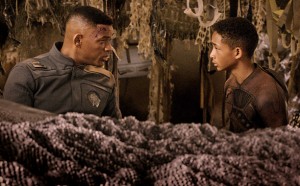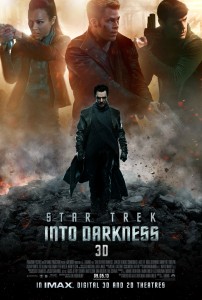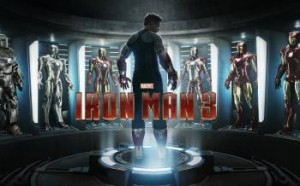Pacific Rim
Posted on July 11, 2013 at 6:00 pm
 I know there’s only one question you have about this movie, and the answer is yes. If you ever wanted to see a movie with giant monsters battling giant robots, this is it.
I know there’s only one question you have about this movie, and the answer is yes. If you ever wanted to see a movie with giant monsters battling giant robots, this is it.
And if you ever wanted to see a movie that is nothing but giant monsters battling giant robots, this is that movie.
Not much more to say after that. And thankfully, director Guillermo del Toro understands that. I don’t remember ever seeing a movie that gets to the point so quickly. Less than a minute into the running time there’s a monster attacking a city and cars falling off a bridge and moments later, we get, you guessed it, a monster fighting a robot. And it’s pretty much monsters and robots from then on.
Not that there’s anything wrong with that. These are some mighty fine monsters and robots.
So, here’s the deal. There are monsters. We don’t know where they came from but they arrive through some sort of “Thor”-like portal under the Pacific Ocean. Its cheeky conceit is that the dinosaurs were a sort of failed advance team and the monsters had to wait until humans evolved and deteriorated the environment until it was Goldilocks-just-right for them.
These are very, very big monsters known by the Japanese term “kaiju.” Del Toro loves monsters, and these are absolutely fantastic. Like Ray Harryhausen, del Toro and his character design team understand that we need monsters to be at the same time very strange and very familiar, impossible but possible. The structure of bone and muscle and teeth has to make sense to us. They have to be able to support their frames and their movements have to feel weighty and powerful. These monsters are masterfully designed, marvelous and scary. There are blue, glowing tentacles and massive jaws with pointed teeth. They attack cities like Godzilla’s gigantic brother, stomping and chomping.
What’s cool here is the sheer scale of the things. Over and over, it take your breath away.
At first, the humans think it is a one-time attack. But then there are others. And the earth has to recalibrate all notions of what is possible, all priorities. They have to find a way to fight the kaiju. They have to build robots the size of the Empire State Building.
The robots look great, with ninja heads and believable scuffs and dents. Some of what they do does not seem physically possible — how does that running and jumping thing work? — but mostly their movements seem to make sense and feel believably powerful and weighty. What goes on inside, not so much. We can build robots the size of a skyscraper but the arms and legs have to be operated manually, like a kind of gym stair-stepper? And what is this mumbo-jumbo about how the pairs who operate them have to be able to “drift” — meld their neural pathways so they can access each other’s thoughts? Oh, well, let’s get to the fights!
Charlie Day provides some comic relief without going overboard as a nerdy scientist. Ron Pearlman shows up as a colorful profiteer. He goes overboard, but that’s what he’s there for. Idris Elba gets to use his real accent for once, is majestic as the guy in charge. Charlie Hunnam, bulked up, fades into the background, more generic than the machines. Whenever they try to add some human interest, everything stalls, but fortunately that does not happen too often.
There are a couple of good touches about the way different elements of civilization respond to the monsters. I couldn’t really understand who was doing what some of the time or what they were saying much of the time (a lot of the usual sci-fi moments of people staring intently into monitors, but it is always nice to Clifton Collins, Jr., and he does better with the jargon than most people). But there were robots fighting monsters and in the middle of the summer, that’s good enough for me.
NOTE: Be sure to stay halfway through the credits for an extra scene.
Parents should know that this film has non-stop and intense sci-fi action violence with massive destruction and genocide, very scary monsters, chases, explosions, suicide missions, gruesome images, sad deaths, brief language
Family discussion: Why didn’t Staker want Mako to go out in the Jaeger? How is the cooperation between Gottleib and Geiszler like the drifting of the Jaeger operators? What are three different ways we saw characters respond to the attacks?
If you like this, try: “Independence Day,” “Top Gun,” “Blade Runner,” and the original “Godzilla”



